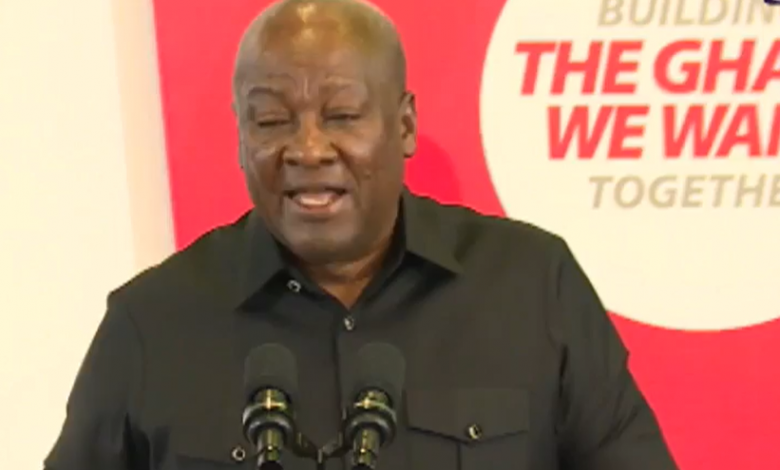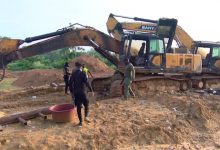
▪ First 120 days in office: Hold a National Economic Dialogue to draw up a 4-year fiscal consolidation programme.
▪ Rationalise taxes.
▪ Abolishing among others E-levy, COVID levy, and 10% levy on bet winnings.
▪ Review import duties and levies on vehicles and equipment meant for industry and agricultural purposes.
▪ Rationalise ports fees and charges.
▪ Implement emergency measures to stabilize the Ghana Cedi and the macro-economy.
▪ Use Price Stabilization and Recovery Levy to cushion consumers.
▪ Investigate NPP’s opaque Gold-for-Oil deal.
▪ Review the Gold Purchase Programme of the Bank of Ghana.
▪ Restore the licenses of wrongfully collapsed banks and financial institutions.
▪ Increasing indigenous participation in the banking and financial sector.
▪ Free statutory funds (GETFUND, NHIL, Road Fund…) for their mandated objects.
ALLEVIATING THE CURRENT ECONOMIC HARDSHIPS.
▪ No-academic-fee policy for first years in public tertiary institutions.
▪ Free Tertiary Education for PWDs
▪ Free Sanitary Pads for girls in school.
QUALITY HEALTHCARE FOR ALL
▪ Uncap the National Health Insurance Levy.
▪ Re-prioritise the health sector by ensuring timely release of payments to service providers.
▪ Establish the Ghana Medical Care Trust (MahamaCares) Fund to support persons with chronic diseases such as kidney failure (dialysis), cancers, Sickle Cell disease, diabetes, hypertension, and other heart diseases.
▪ Implement Free Primary Healthcare services from the CHPS compound level to the district level in the medium term.
▪ Expand health infrastructure to restore the automatic employment and timely deployment of health workers.
▪ Construct a state of the art 500-bed Specialist Children’s Hospital and Fertility Centre in Accra.
▪ Expand facilities at the Ho Teaching Hospital to provide comprehensive specialist services with the view to establishing a quaternary hospital in the Volta region to attract medical tourism.
▪ Build a Specialist and Trauma Hospital in the Oti Region for emergencies on the eastern corridor.
▪ Establish a modern dialysis centre in hospitals in regions that don’t have them.
▪ Build modern hospitals in Bawku, Yendi and other underserved areas.
24-HOUR ECONOMY
Formula 1:3:3
Same Job, Three Shifts, Three People
▪ Extraordinary problems require extraordinary solutions for extraordinary results.
▪ Businesses and public organizations to operate 24/7 in three shifts of eight hours.
▪ Boost production, promote productivity, generate well-paying jobs.
▪ Transform Ghana into an import substitution and export-led economy.
▪ Increase employment opportunities and revenue.
▪ Enhance access to public services.
▪ Focus on selected public institutions with large customer traffic:
o Ports and Harbours
o Customs
o Passport Office
o DVLA etc.
▪ Private sector focus:
o Agro-Processing
o Manufacturing
o Pharmaceuticals
o Construction
o Financial Services
o Extractive industries
o Sanitation and Waste Management
o Hospitality Industry
o Retail Centres
o Transportation Services
o Health Services
o Security Services
SUPPORT PACKAGE FOR 24-HOUR BUSINESSES
▪ Stimulate demand for 24-hour economy goods & services.
▪ Supported by strategic investments in infrastructure, security, energy etc.
▪ Public and private security architecture.
▪ Cheaper and reliable electricity (Time-of-Use tariff system)
▪ Tax incentives for cost reduction.
▪ Support from Ghana Exim Bank for agro-processing & manufacturing to boost exports.
▪ Support SMEs operating below capacity with catalytic investments to grow & generate jobs.
ACCELERATED EXPORT DEVELOPMENT COUNCIL (AEDC)
▪ Chaired by the President.
▪ To promote exports under the 24-hour economy strategy.
WOMEN’S DEVELOPMENT BANK
▪ Special-purpose bank
▪ Low-interest loans
▪ Tailored financial services on very flexible terms.
▪ Empower ONE MILLION (1,000,000) Ghanaian women.
▪ Support women-owned and women-led businesses
NATIONAL APPRENTICESHIP PROGRAMME (NAP)
▪ For self-employment
FREE TECHNICAL AND VOCATIONAL TRAINING FOR YOUNG PEOPLE.
▪ Trained apprentices graduated with certification.
▪ Provide start-up capital & equipment.
“ADWUMAWURA’’ PROGRAMME
▪ Special business start-up policy with focus on the youth.
▪ Create, track and mentor 10,000 businesses annually.
BUSINESS DEVELOPMENT
▪ Exempt new small businesses from corporate and personal income tax for the first two years after their incorporation.
▪ Review Customs (Amendment) Act, 2020 (Act 1014) to scrap the ban on importation of salvaged vehicles.
▪ Save the local automotive industries—Suame Magazine, Kokompe, Abossey Okai.
▪ Support the redevelopment of the Abossey Okai, Suame, Kokompe and Cape Coast Artisanal enclaves.
▪ Implement a ‘Made in Ghana Agenda’ for production and consumption of Made-in-Ghana goods.
▪ Launch an “Export Ghana Policy” (AfCFTA & other external trade programmes).
▪ Enhance the role of Ghana EXIM Bank in financing non-traditional exports.
▪ Mo-Ne-Yo Pension Scheme for informal sector workers.
▪ Commercial drivers and motorcyclists (Okada).
▪ Small scale miners, farmers, fishermen, traders, market women
DIGITAL JOBS INITIATIVE
▪ Partner the private sector to invest $3 billion to leverage ICT for jobs through:
o One Million Coders Programme: Coding, WebApp development, software engineering etc.
o Stimulate demand for made in Ghana software.
o Government using locally developed software will employ our coders and reduce foreign exchange payments for subscriptions to overseas vendors.
▪ Establish Regional Digital Centers for Business Process Outsourcing (BPO).
▪ Invest $50million in a FinTech Growth Fund to promote digital entrepreneurs.
▪ Set up Zonal ICT Parks to make Ghana the hub for innovation, artificial intelligence and cybersecurity in Africa.
▪ Re-develop the Dawa ICT park into a world-class centre of excellence.
GHANA FIRST FLAGSHIP PROGRAMME FOR JOBS
▪ Work with private sector to make Ghana the Pharma Hub of Africa.
▪ Develop an integrated aluminium industry for industrialization.
▪ Invest in the production of plastics, fertiliser and other synthetic materials.
▪ Expansion of the automotive and vehicle assembly sector.
▪ Promote light industrial manufacturing, especially of apparel and electronic products
RAPID INDUSTRIALIZATION FOR JOBS
▪ Promote value addition & diversification for domestic consumption and exports.
▪ Establish strategic industries and revive defunct ones.
▪ Revamp the textile and cotton-allied industry.
▪ Set up Agro-Industrial Zones in all regions.
▪ Establish mini-processing plants for cassava, tomatoes, fruits etc.
▪ Set up cashew processing factories in the Bono, Bono East and Ahafo regions.
▪ Establish cocoa processing factories in Western, Western North, Eastern, Central, Ashanti, Bono, Bono East, Ahafo, Volta and Oti regions.
▪ Facilitate the construction of twenty (20) medium-scale animal feed processing plants and revamp the collapsing poultry industry.
AGRICULTURE for JOBS.
▪ Make agriculture attractive through modernisation to ensure food security and job creation.
▪ Reduce food inflation to lower the high cost of living through our Agriculture for Economic Transformation Agenda.
▪ Roll out a Feed Ghana Programme – to boost food production, guarantee food security and supply raw materials to industries.
▪ Establish Farmer Service Centres to support farmers with modern agriculture equipment, technologies and inputs in all districts.
▪ Create Farm Banks within agriculture zones to ease access to land, and irrigation facilities for agricultural purposes and encourage young people into farming.
PROMOTING GOOD GOVERNANCE AND COMBATTING CORRUPTION
▪ Remarkably reduce the size of government (sixty (60) Ministers)
▪ Address the benefit disparities between Article 71 office holders and the wider public service.
▪ Scrap payment of ex gratia.
▪ Establish an Independent Emoluments Commission by merging the Presidential Commission on Emoluments and the Fair Wages and Salaries Commission.
▪ Ruthless War Against Corruption: “Operation-Recover-All-Loot” (ORAL).
▪ Prohibit political appointees, politically exposed persons and all serving public officials from purchasing state assets.
▪ Reopen investigations into major unresolved cases including the Ayawaso West Wuogon by-election violence, 2020 election killings, unresolved murder of Ahmed Hussein-Suale and Silas Wulochamey.
TRANSFORMING EDUCATION
▪ Dedicate equitable attention to all levels of education.
▪ Improve Free SHS
▪ Provide dedicated and sustainable source of funding for Free SHS
▪ Decentralise the procurement of food for SHS to boost local economies.
▪ Implement a ‘No-Academic-Fees’ policy.
▪ Use 5G and Low-Earth Orbit systems to improve the quality of education across the country by extending course tutorials to students everywhere through on-demand learning platforms sanctioned by the GES.
▪ Provide continuing students with financial assistance by re-introducing the Student Loan Trust Fund Plus (SLTF+) and a reformed scholarship regime.
▪ Provide Free Tertiary Education for all Persons with disabilities (PWDs).
▪ Implement a ‘Bed-for-All’ programme by building on-campus affordable students’ hostels & expanding accommodation facilities for tertiary students through PPPs.
▪ Legislation to streamline and regulate the award of government scholarships.
▪ End collateralisation of the GETFund.
▪ Abolish the teacher licensure examination and integrate the licensing process into the final year examination.
▪ Institute the “Teacher Dabr3” Project to provide accommodation facilities for teachers within their schools.
▪ Implement a 20 percent (basic salary) special allowance for teachers & health workers who accept postings to rural and underserved communities.
▪ Expand infrastructure to ensure prompt employment of nurses, health workers and teachers.
▪ Assist teachers to own vehicles of their choice by offering flexible duty payment arrangements and employer guarantees in partnership with teacher unions and the banking sector.
AGE OF MODERN RAILWAYS
▪ Western and Eastern lines connected to land-locked countries under PPP including BOTs.
▪ Construct Urban intracity railways and Bus Rapid Transits (BRT) for largest population centres.
PROMOTING RESPONSIBLE MINING FOR SUSTAINABLE DEVELOPMENT
▪ Ban issuance of new mining leases and activities in forest reserves.
▪ Amend the Mineral and Mining Law to impose stiffer punishment on mining in water bodies.
▪ Decentralise regulatory and licensing processes for artisanal miners.
▪ Establish Mining Cooperatives in all mining districts.
▪ Set up a novel Ghana Gold Board (GOLDBOD) to regulate small-scale mining.
▪ Implementing a ‘Tree for Life’ re-forestation policy with cocoa, palm and rubber.
▪ Implement a Blue Water Initiative to heal and harness the environment by turning areas and water bodies degraded by illegal mining into hubs of economic and ecological recovery.





